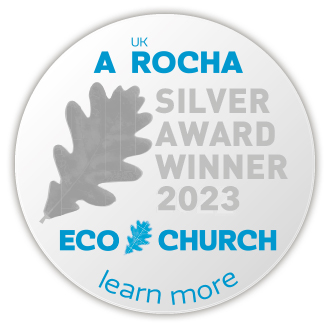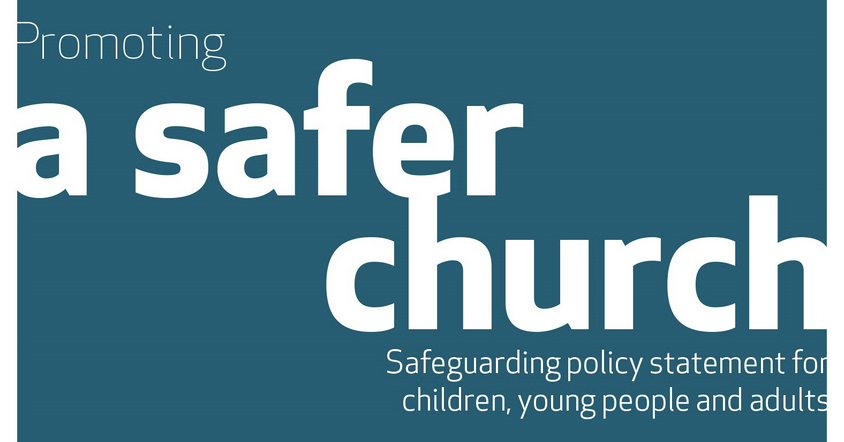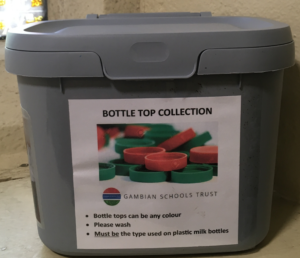
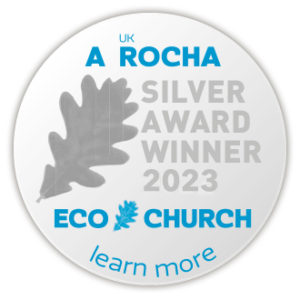
All Saints’ Halifax has signed up to the EcoChurch Initiative and has now achieved Silver Award.
Here is an explanation of the scheme copied from their website:
Churches complete the unique online Eco Survey about how they are caring for God’s earth in different areas of their life and work. The answers a church provides will collect points towards an Eco Church Award – the more your church does, the more points you get!
The survey takes you through five key areas of church life:
- Worship and teaching
- Management of church buildings
- Management of church land
- Community and global engagement
- Lifestyle
To read more about the initiative: https://ecochurch.arocha.org.uk/
Click here to watch a video about the initiaitive: https://youtu.be/vPkxLkjilJM
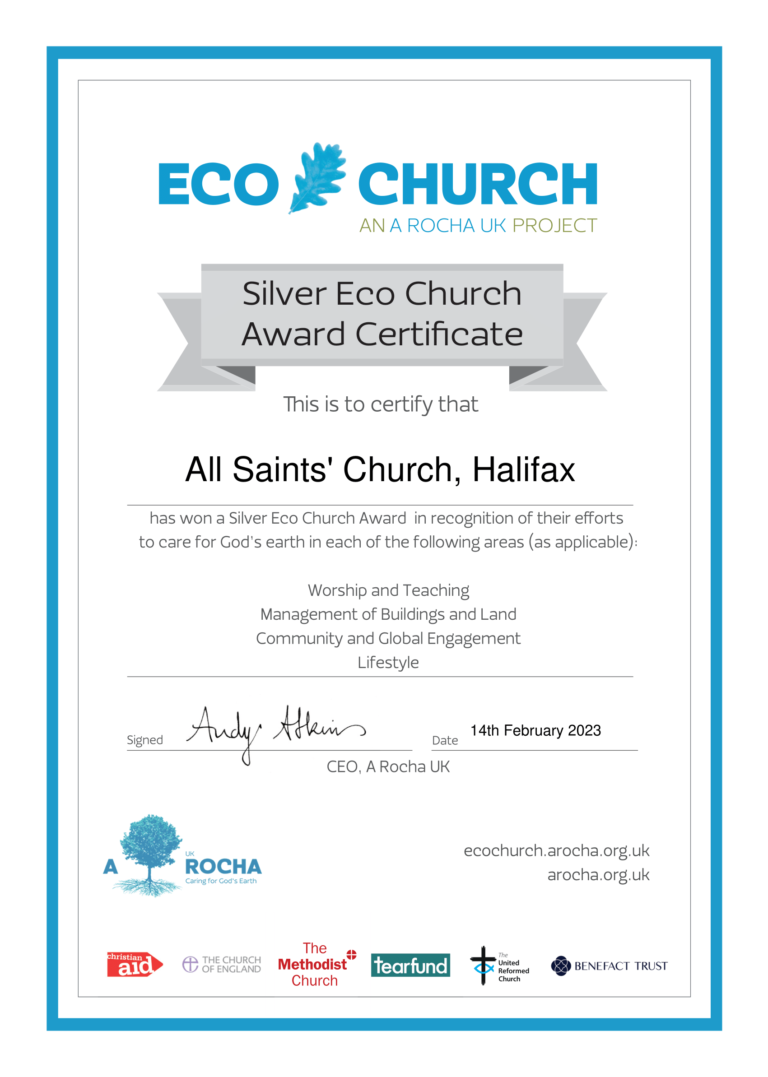
Veg Shed
In September 2024 we received a new addition to the garden as we agred to host a shed for Pennine Cropshare, a local, organic veg scheme who were looking for a collection point in our community.
More information about them here
Two Events in July which we encourage parishioners to get involved in:
The Big Butterfly Count
Re-opens on 1st July for the main event between Friday 12th July and 4th August.
Register now, and download resources from their website: here

Plastic Free July
Are you looking for ways to be part of the solution to plastic pollution?
This July, join millions of people worldwide reducing their plastic waste by choosing to refuse single-use plastic.
Check out our resources and ideas here and get inspired to help reduce plastic waste everyday at home, work, school, and even at your local café.

Churches Count on Nature: Sat 8th – Sun 16th June 2024
Churches Count on Nature 2024 runs at the same time as Love Your Burial Ground Week, and focuses on the brilliant wildlife to be found in churchyards and chapel yards. It is a is a joint initiative promoted by Caring for God’s Acre, the Church of England, the Church in Wales and A Rocha UK.
Anyone can take part in the Count, simply head to a churchyard, cemetery or other type of burial ground and make a note of what you see – from the trees and flowers to the birds and bugs. More Information Here
Record your findings on the iNaturalist app (which is the recommended way) or by downloading the form: Churches Count for Nature recording-form-v2.
Recording Information from Caring for God’s Acre
The Church of England is running webinars on different aspects of land and nature, as well as links to previous recordings. These can be found at:Webinars



The Church received this award in 2024 for our efforts to be Wildflie Friendly in both the garden and graveyard.
In May 2024 we encouraged our families during half-term to take part in National Children’s Gardening Week and we rose awareness of World Bee Day on May 20th.


Parishioners at All Saints’ have been encouraged to sign-up to the Carbon Fast for Lent since 2023.
This can be found at: Climate Stewards Carbon Fast for Lent
In the Bible, caring for creation is God’s first instruction to humans. This Lent, a time when Christians traditionally fast and focus on God, we encourage you to take up our Lent challenge – living more simply and finding new ways to cut your carbon footprint.
How the Carbon Fast works:
Each week will feature a different theme designed to help us take climate action. You will receive a weekly email containing some key facts, suggestions for how you could reduce your carbon footprint, and a prayer.
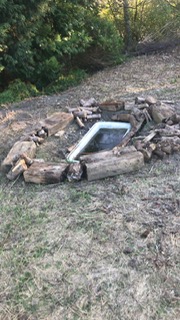
Wildlife Pond
In the autumn of 2023 work was started on creating a pond in the graveyard, to encourage different wildlife into the area.
There is plenty still to do!
Bike Rack Installation
A bike rack was installed at the side of the main church door during March 2023.
This was donated by a parishioner and installed, using garden project funds, by some of our Eco Team with the help of the Community Payback Team who work in the graveyard mid-week.
It will accomodate six bicycles and is intended for use by both church and school.
After Christmas 2021 with money raised from not sending each other Christmas cards, but donating to a communal card in church, we twinned both our toilets through Tearfund.
In January 2022, with money raised over Christmas, we twinned our wheelie bin with one in Nigeria, through Tearfund.
With our Harvest donations in 2023 we twinned our Welcome Garden with a garden in Kenya, through Ripple Effect.
We take part in Plantlife’s No Mow May initiative as part of our eco awareness.
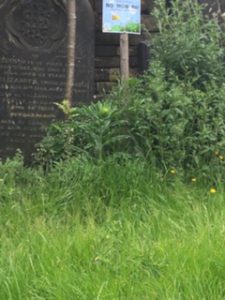
Rev. Jennifer has produced a booklet about the Wildlife in All Saints’ Churchyard.
A copy can be accessed here
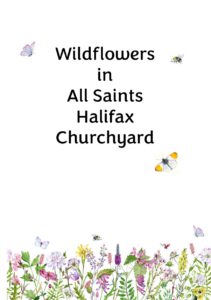
“The earth is the Lord’s, and everything in it, the world and all who live in it” Psalm 24:1
The Creation Care scheme aims to encourage households to make changes to care for God’s earth. Wherever households are on their creation care journey, we want to provide ideas for their next steps, and recognise progress that’s made.
The scheme covers 7 areas of household life:
- Worship and prayer
- Home
- Garden
- Travel
- Food
- Possessions
- Community and global engagement
Sign up and register for the scheme at https://creationcare.org.uk/
All Saints has signed up to the scheme so if you select our church, you will be added to the households from our congregation who are participating.
The Welcome Garden which was made at the front of church in 2019/20 is encouraging the community to garden and respond to the natural world around them. The Uniformed Organisations in the area have been very keen to get invovled: the Cubs and Scouts introducing bird feeders and bug boxes. The Rainbows, Guides and Brownies donated a bird bath and a herb patch has been planted.
A water bowser was sited behind the church in 2021 to collect rainwater for watering the Welcome Garden in dry spells and in 2023 a water butt was placed in the graveyard for watering flowers on the graves.
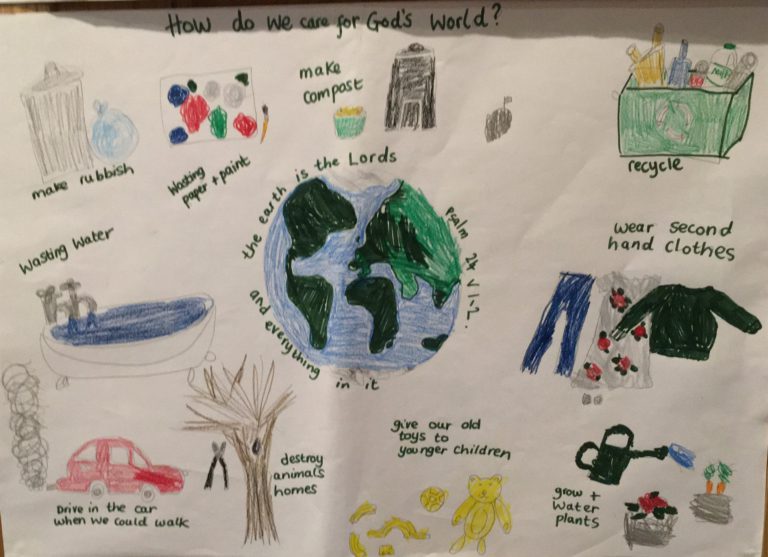
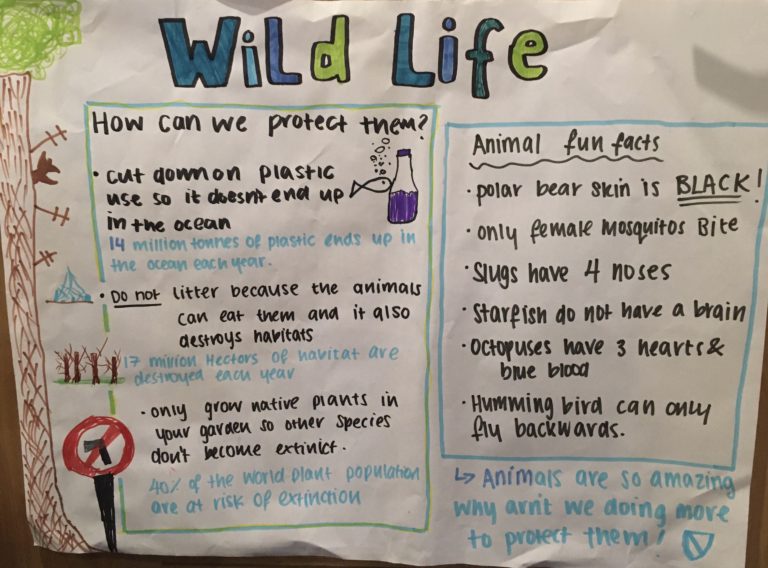
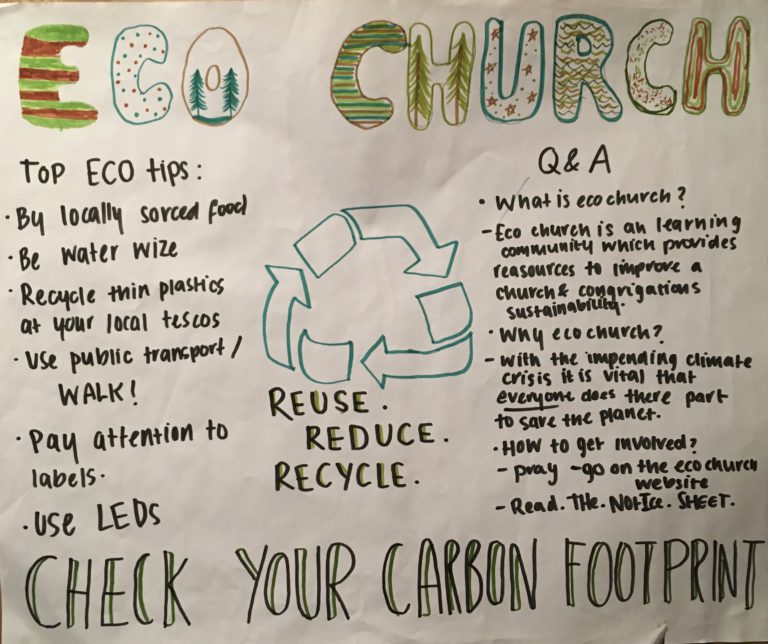
Eco Tips
Eco Travel
- If you are going away pack a zero -waste or sustainable travel kit. Resist the temptation to buy unnecessary new items.
- If you need to buy toothpaste, toothbrush, cotton pads, wipes and shampoo look for environmentally friendly items. For example, shampoo bars and 100% biodegradable plastic-free eco wipes.
- Make sure you have a re-usable water bottle and reusable bags.
- When on holiday in the UK and overseas support the local economy by dining in local restaurants, purchasing locally made souvenirs and gifts, visiting the local markets and pretty much anything local!This way you know your money is being fed back into the community and to the people who are hosting you.
Longer days and (hopefully!) better weather should mean we can spend more time outdoors. Walking, cycling and using public transport all help to reduce emissions. Think! Could you leave your car at home for more of your journeys this next week?
Drive at the speed limit. Boring? Yes. But it’s also safer, cheaper and better for the environment. “Studies have shown up to 30% of the difference in miles per gallon (MPG) is due to driving habits alone. You could save more than a ton of CO2 per year by:– Accelerating slowly and smoothly– Driving the speed limit– Maintaining a steady speed– Anticipating your stops and starts”
Staycations are one of the most eco-friendly ways to take a vacation because you are cutting out the carbon emissions from high-intensity emission travelling (i.e. planes).One of the greenest ways is to seek out local activities, such as wandering around undiscovered areas of your neighbourhood or visiting local museums. If you want to go a little farther, think about driving to a beach, park, or forest for a few hours. You don’t have to go far to have an enjoyable holiday.
Eco Shopping
- Every time you buy an item of clothing ask yourself, “Will I wear it thirty times?”. If the answer is yes, then buy it, but otherwise don’t.
- Buy from thrift shops.You can find some great quality clothes in second hand or charity shops and it’s cheaper than buying new or buying from unethical clothes manufacturers.
- Look for sustainable, natural materials. Find clothes or linen made from sustainable organic cotton, bamboo or hemp.
- Do you really need three black t-shirts made out of thin fabric? What if you bought one, made from 100% cotton sourced from sustainable practices? Not only will you dress better, but you’ll feel better about what you wear, too.
Buy less often, avoid polyester if you can, buy high quality and wear more often. Polyester, which is the most commonly used fibre in clothing, is made from plastic and will never fully decompose. Instead, it acts like other forms of plastic, which are rarely recycled and will break down into microplastics for years to come, harming wildlife and emitting carbon dioxide into the atmosphere.
Choose green delivery options when you shop online. We use online shopping for the convenience, but did you know opting for “click and collect” can make your shopping greener? Picking up your parcel from a store, locker or petrol station instead of having it delivered to your doorstep can reduce carbon emissions if picking it up doesn’t involve a car journey — and the same goes for returning items.
“Bracketing” is a trend where people buy multiple items of clothing online with the intention of returning some of them. Unfortunately, many of these clothes end up in the landfill as it’s cheaper and easier for the company to scrap them than to put them back on sale. If you’re particularly worried about finding something your size, try to go to a physical store to try on a garment or go for second-hand clothes to lessen your impact.
Don’t always choose the fastest delivery optionIf you don’t really need the thing you’re buying delivered tomorrow, choose a longer delivery option. Longer delivery times give retailers the opportunity to plan their delivery schedule more efficiently and for this reason they tend to be more eco-friendly.
Eco Energy Use
- Energy-saving light bulbs last up to 12 times as much as traditional bulbs, providing the same amount of light quality for much less energy. 80% of the energy used to power traditional bulbs is lost in heating energy, whereas LED light bulbs run at 80-90% energy efficiency.
- Switch it off. Leaving a room? Switch the light off. Turning the TV off at night? Switch it off at the wall so it isn’t left on standby.
- Use matches instead of plastic lighters 1.5 billion plastic lighters end up in landfill every year. Switch to matches which you can compost after use.
- Buy Energy Efficient Appliances. Once an appliance has irreparably broken this is a good time to look into replacing it with a far more energy efficient one.
- Check your home for draughts. “Draught-proofing is one of the cheapest and most effective ways to save energy – and money – in any type of building.” – Energy Saving Trust
Eco Investment Tips
- By avoiding banks that invest in the fossil fuel industry, you can use your savings to protect the planet. Ethical banks do not invest your money into oil, coal or gas industries. Placing your money in an ethical investment fund will also allow your savings to contribute towards caring for the planet.
After Christmas 2021 with money raised from not sending each other Christmas cards, but donating to a communal card in church, we twinned both our toilets through Tearfund.
In January 2022, with money raised over Christmas, we twinned our wheelie bin with one in Nigeria, through Tearfund.
Our Harvest donations in 2023 when in part to twin our garden through Ripple Effect, with one in Africa.
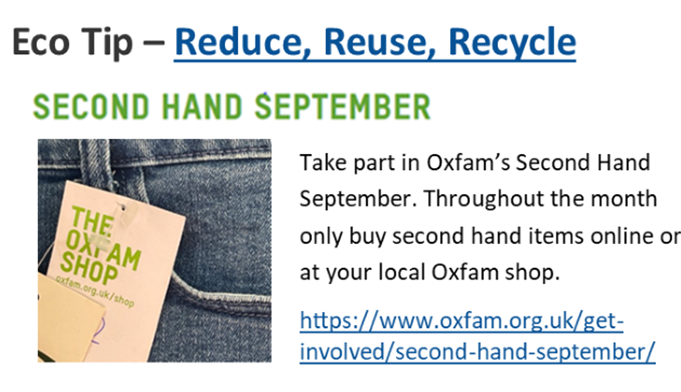
Eco challenge – Reduce, Reuse, Recycle
Have a sort out and identify TEN things you can give to a charity shop before the end of the month.
Cut your tubes open to get the last bit of product and don’t let any of it go to waste
Avoid plastic clingfilm by switching to beeswax wraps.
Use cloth napkins instead of paper napkins.
Try a shampoo bar to avoid using plastic bottles.
THINK before you PRINT! Think about whether it is absolutely required to have a document in hard copy. Save personal documents in a folder on your own device or send by email to others.
When making packed lunches invest in lunch boxes that are reusable, instead of putting food in bags that are to be thrown out. If a food item truly needs to be wrapped, avoid using cling wrap and opt for more environmentally friendly wrapping materials like beeswax.
Take hard-to-recycle beauty, healthcare and wellness products that cannot be put in the council home recycling to Boots stores.
- Too small (travel minis, samples, mascaras, etc)
- Made of composite materials (make-up palettes, compacts, lipsticks, etc)
- Made from non-recyclable materials (toothpaste tubes, lotion pumps, etc)
Shop Local – check out Just Gaia, the plastic free shop in the Piece Hall. Take your own containers to refill or consider their wide range of plastic free products. Browse (and order!) online at: JustGaia Shop
Or, if you are in Brighouse, Ryecorn Wholefoods have refills for beauty and household cleaning products and cereals.
Eco Tip – Food and Drink
Use your ‘LOAF’: Local, Organic, Animal friendly, Fairtrade
Local – This reduces food miles; transport, fuel and packaging and means that we can enjoy seasonal food at its best. Check your shopping list! How many items can you switch to ones that are locally produced?
Organic – This ensures that the crops and animals are produced without chemicals, pesticide or routine antibiotics, it’s better for them, better for us and better for the whole planet. Check your shopping list! How many items can you switch to ones that are labelled organic?
Animal Friendly – If we are eating food from animals, be that meat, eggs or dairy, let’s choose to buy products that come from animals that enjoy high welfare, including free ranging, and organic diets. Check your shopping list! Are the food items you buy high animal welfare or free range?
Fairtrade – Many producers around the world are not being paid enough to send their children to school, buy enough food and medical care for themselves, or allow them adequate housing – often because we want cheap food. Fairtrade helps farmers get a fair price for their products. Check your shopping list! How many items can you switch to ones that have the Fairtrade logo?
Eco Tip – In the garden
Go native – One of the best ways to attract wildlife to your garden is to fill it with as many native plants as possible. Native wildflowers are easy to grow and maintain, and are often more resistant to pests than non-natives. They are also ideal for attracting bees and butterflies, which need all the help they can get with numbers declining across the country.
Get wild – It is understandable that you want to keep your garden neat and tidy, but an overly-manicured space leaves little room for wildlife. Allow a section of the garden to become overgrown and, by letting nature take its course, you will have created a more attractive environment for all things wild.
Get composting – Compost heaps are a surprisingly valuable habitat feature for wildlife and may help to attract a wide variety of creatures into your garden, ranging from earthworms and frogs to hedgehogs and lizards. Always avoid using peat in your compost, as extracting this can destroy unique ecosystems that take centuries to form.
Support #NoMowMay by giving your lawn mower a rest for the month. Let things grow – you might be surprised by what germinates in your lawn. Clover seeds may already be present (they used to be in packets of lawn seed) and other seeds get blown in or dropped by birds. Over the month (or more), plants that have been lying dormant may have a chance to grow, bloom and make for some happy pollinators.
Eco Issues- Climate Acton and Social Justice
During Christian Aid Week annually, and beyond, support Christian Aid as they advocate for justice on issues of poverty relating to climate change, debt and the need for peace.
Their website Christian Aid Campaigns has lots of helpful information and resources to get you involved with social justice.


